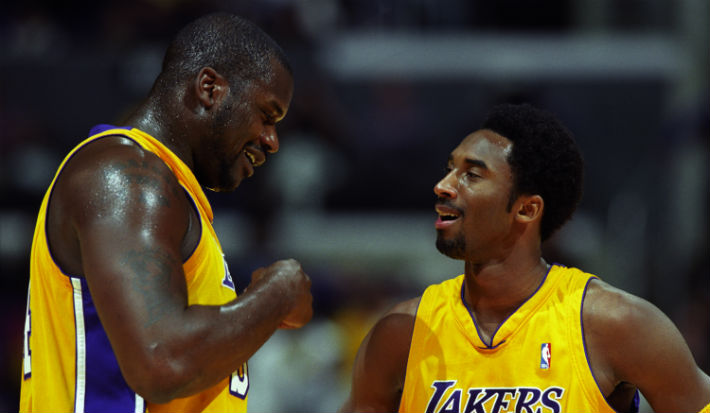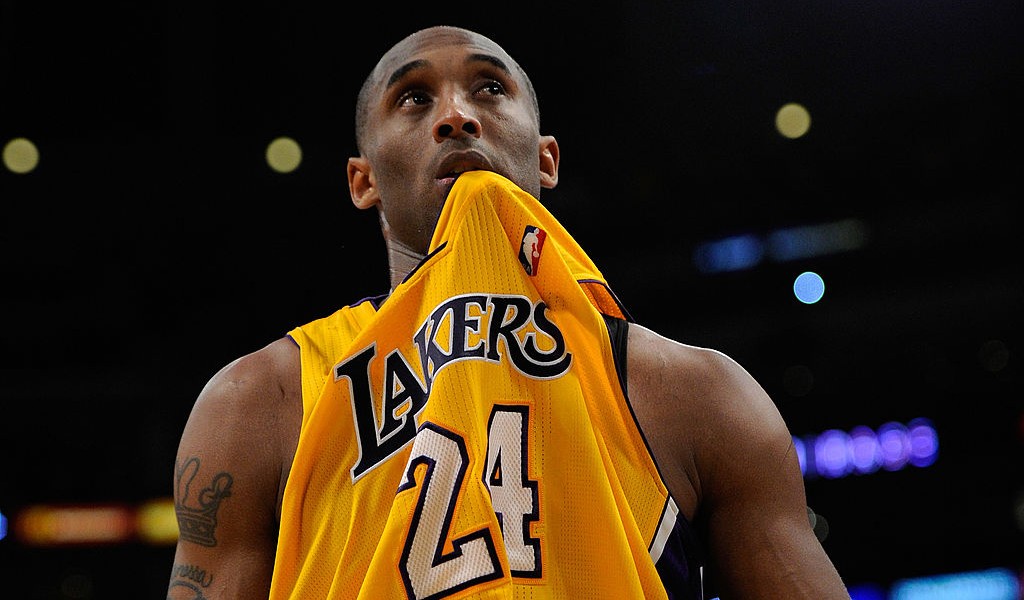The Word docs go back 18 years and six or seven laptops at this point. Quotes from him, quotes from teammates and coaches and opponents, lots of rambling thoughts of my own. I had big plans for … something, probably not a book, but at the very least some big, thought-provoking feature. Alright, so maybe just some tweets. In the end, I’ve got this. Whatever this is.
What didn’t change over all those years was the thesis statement, which was and remains this: Even before the awfulness on the morning of Jan. 26, Kobe Bryant was probably the most compelling American athlete of my lifetime. I’m sure cases can be made for others, but they won’t be made here.
He was born in Philadelphia and spent his high school years in the affluent Philly suburbs. In between, he spent a sizable chunk of his childhood in Italy, where his father was playing professionally, and where he learned to speak Italian, love soccer, and otherwise lived a very different childhood than that of the men who would eventually be his peers. Years later, after I got to know him — on some level, for a short time — I always thought that part of his story mattered.
I was just out of college and working for a small newspaper when I first saw him; I’d driven down from Wilkes-Barre to Bethlehem, Pa., to cover a local team in a state playoff game, and when that game ended, I had a chance to catch exactly one quarter of Lower Merion’s tilt against Scranton High. At the end of the first quarter, Kobe had 12 points, and his team led 20-0.
And then he was a state champ, one who earned a McDonald’s All-American nod and was named the National Player of the Year for what he accomplished on the floor, all while taking Brandy to prom. A few months after that, he was a Laker, and I was one of those Laker fans who was re-engaged after a rare run of (relatively) dry years. I watched as he and Shaq and the rest built toward their new-millennium dynasty, and then, just as the threepeat was about to get underway, I stumbled into a job at a basketball magazine. It would’ve been a cool job for anyone who loved basketball. For a Laker fan in the fall of 1999, it was the coolest job imaginable.

I finally got the chance to interview Kobe for a potential cover feature in the spring of 2002. He and Shaq and Phil already had a pair of trophies, and they were on their way to a third, but I didn’t want to ask Kobe about any of that. I wanted to ask him if he cared about all the 15-year-old kids who thought he was “fake.”
I’m aware of how insane this sounds now, but it was a narrative that was prominent enough at the time to dominate the magazine’s letters section. Kobe was already hugely popular, of course, but he was also widely hated, and not only because of the way he brashly and consistently torched every non-Laker fan’s favorite team. A not insignificant number of fans — younger ones mostly, the sort of fans for whom basketball was less a game than a lifestyle, and one increasingly inseparable at that time from hip-hop culture — hated Kobe, resented Kobe, because they thought he was a fraud. They thought he’d cribbed his place in the game, that he could never be Jordan on the court or Iverson for the culture. This was not the sort of thing that rose to the attention of ESPN, generally, but for a lot of our readers, it mattered.
It mattered to Kobe, too.
I know because I asked him, at a truncated off-day media availability the day after he got into a fight with Reggie Miller late in a 2002 game against the Indiana Pacers. It was an ugly altercation that cost Kobe a two-game suspension, so he wasn’t doing extensive media that day, but he did agree to talk with me as scheduled, which he didn’t have to, and which was very cool given that I’d flown across the country for that purpose.
And it turns out Kobe was intrigued. Kobe read those letters. Kobe was aware and attuned to what those 15-year-old kids thought. And I found this fascinating, that this 23-year-old four-time All-Star and two-time NBA champion would have any idea that some hoop junkie teens questioned the authenticity of his place in basketball culture, let alone care. I was also, still, a fan, far too much of one to take it at all objectively when Kobe told me I was on to something, and that he wanted to talk more, and when he gave me his phone number, which asked me to keep tight because it wasn’t something he usually did.
I’ll never know if he played me, or if his temporary connection to a fan-slash-journalist he’d just met was sincere for however long it lasted. It didn’t help a month or two later when he called just to say “what’s up.” He was on the team plane somewhere, waiting to take off, and I was the person he called to pass the time.
Not long after, the Lakers were in Philly. I was on my way down for the game when I got an unexpected call from the Sixers: Given high media demand, they had rejected my credential request. Already on the train and lacking any other option, I called Kobe and left a voicemail explaining the situation. It was last second, and probably crazy to ask, but was there any chance he could spare a ticket?
I got a call back not long after from his traveling bodyguard telling me no problem—Kobe had me covered, with a spare if I needed one. And I kept going back and forth between two thoughts:
1. How cool was that?
And…
2. How weird, for the one game a year in his hometown, with so many family and friends and former teammates living nearby, that he had tickets to spare?
It’s nothing more than my desire for all this to mean something that it actually might: That the reason Kobe and I briefly “connected” was because this intelligent, handsome, charismatic, supremely talented athlete, playing for one of the glamour franchises in American sport, with Hollywood in the courtside seats and the rest of the world watching, didn’t really have anyone else to talk to.
He’d been married a little over the year at that point, to a woman four years his junior. The stories of his aloofness with teammates and his apparent estrangement from his own family were already well known. I never asked and I’ll never know, but the possibility struck me as at least feasible at that point in his life and career, and it made me sad.

We rescheduled that interview for 2002 preseason, when I adjusted the schedule of my honeymoon to include a couple of days in L.A. for the photo shoot and interview. (Yes, I brought my wife along to the shoot.) We talked about his perception issues, such as they were. We talked about coexisting with Shaq, about his place in the game, about how much winning mattered, which was more than anything.
And then what happened in Colorado happened that following summer, and it seemed unbelievable until it didn’t. A credible rape accusation, a dismissed criminal case, and a civil settlement didn’t legally add up to “guilty,” but the stain was there. Permanent, even if never fully resolved. There was no direct communication after that. I felt naïve and dumb for thinking I had any sense of who he was.
When he was back in the league, trying to establish this strange, unprecedented second act of his career, dealing with Kobe changed. There were calls with him and Rob Pelinka, his longtime agent, in which they pitched cover concepts — and understand, no other player ever pitched cover concepts — in which Kobe’s next SLAM cover would feature a grainy childhood photo of him holding a basketball, or a close-up of part of his face, with a flame photoshopped into his eye, to emphasize his burning competitiveness and dedication to the game. Those never happened, nor did the feature-length first-person essay he proposed, which, again, is not a thing that any other player proposed, ever.
There were plenty of other covers, most memorably (for me) the shot of Kobe holding a non-venomous snake that doubled for a deadly black mamba. We shot him in Soho one night, and he joked about being scared shitless by this creature, but once he knew it wasn’t a threat, once he knew he had control, he handled it confidently and posed for as long as the photographer needed him to.
And then I left my job and New York, and Kobe stayed in L.A. and won two more championships largely on his terms. I found myself rooting against him then, aggressively, resentful for reasons I couldn’t fully name. But I kept watching, even as he battled and occasionally limped toward retirement, following his own script all the way, right up to that last ridiculous, joyous game of his career, a game that thumbed its nose at retirement and even death, so it felt. He took 50 shots to get 60 points. He raged and raged. That night, I cheered and smiled and cried.
I look back over what I’ve written and I hate how much of it is nominally about me, but this narrow perspective is the only one I have. There is so much more to the man, to the career and the life: The inspiration from Jordan, the dominant, dysfunctional marriage with Shaq, the rivalry with LeBron that never quite got its chance. What he meant to Southern California. What he meant to so many players who followed him. What he was doing in retirement, the vision that pushed him and gave him something to chase. His wife, and his daughters, above everything else.
He remains the only athlete I’ve loved and hated in the space of a single career. He fascinated and confounded me in a way no other athlete has. I don’t think I ever figured him out. I’m certain I’ll never forget him.
Ryan Jones is a former Editor in Chief at SLAM. He lives in Pennsylvania.







